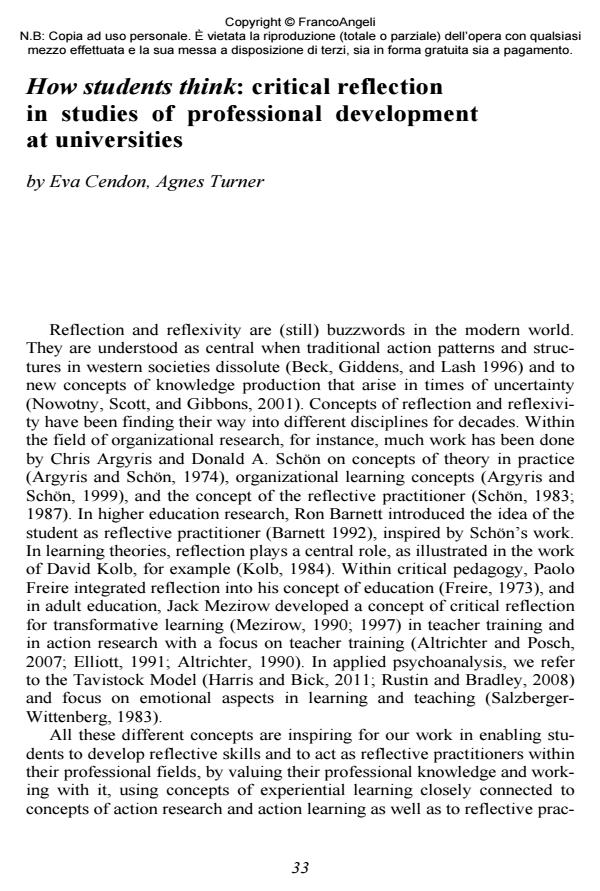How students think: critical reflection in studies of professional development at universities
Journal title EDUCATIONAL REFLECTIVE PRACTICES
Author/s Eva Cendon, Agnes Turner
Publishing Year 2015 Issue 2015/1
Language English Pages 18 P. 33-50 File size 118 KB
DOI 10.3280/ERP2015-001003
DOI is like a bar code for intellectual property: to have more infomation
click here
Below, you can see the article first page
If you want to buy this article in PDF format, you can do it, following the instructions to buy download credits

FrancoAngeli is member of Publishers International Linking Association, Inc (PILA), a not-for-profit association which run the CrossRef service enabling links to and from online scholarly content.
In this contribution, the authors focus on professionals who return to university to study and develop their reflective attitude. Using the concept of the reflective act of thought by John Dewey, one of the founding fathers of experiential education, as a point of reference, the authors analyze students’ reflective thinking based on descriptions of their working practice at the outset of university studies, and question to what extent the five steps of the reflective act of thought can be found. The authors critically discuss the results and formulate implications for the further development of studies of professional development at universities. Finally, they address various ways in which teachers can advance students’ critical reflection
- Altrichter H. (1990). Ist das noch Wissenschaft? Darstellung und wissenschaftstheoretische Diskussion einer von Lehrern betriebenen Aktionsforschung. München: Profil.
- Altrichter H. and Posch P. (2007). Lehrerinnen und Lehrer erforschen ihren Unterricht. Unterrichtsentwicklung und Unterrichtsevaluation durch Aktionsforschung. Bad Heilbrunn: Klinkhardt.
- Argyris C. and Schön D.A. (1974). Theory in Practice. Increasing Professional Effectiveness. San Francisco: Jossey-Bass.
- Argyris C., Schön D.A. (1999). Die lernende Organisation. Grundlagen, Methode, Praxis. Stuttgart: Klett-Cotta.
- Argyris C. (2002). Double-loop learning, teaching, and research. Academy of Management Learning & Education, 1(2): 206-218.
- Barnett R. (1992). Improving Higher Education. Total Quality Care. Buckingham, Bristol: SRHE and Open University Press.
- Beck U., Giddens A. and Lash S. (1996). Reflexive Modernisierung. Eine Kontroverse. Frankfurt am Main: Suhrkamp.
- Bick, E. (1964): Notes on Infant Observation in Psychoanalytic Training. International Journal on Psychoanalysis, 43: 238–332.
- Bion, W. (1984). Learning from Experience. Karnac Books: London
- Dewey J. (1910). How We Think. Mineola, New York: Dover Publications.
- Elliott J. (1991). Action Research for Educational Change. Philadelphia: Open University Press.
- Freire P. (1973). Pädagogik der Unterdrückten. Bildung als Praxis der Freiheit. Reinbek: Rowohlt Taschenbuch Verlag.
- Gibbons M., Limoges C., Nowotny H., Schwartzman S., Scott P. and Trow M. (1994). The New Production of Knowledge. The Dynamics of Science and Research in Contemporary Societies. London: Sage.
- Harris M. (1987). The Tavistock training and philosophy. In: Tay, S. (ed.) Collected Papers of Martha Harris and Esther Bick. Scotland: Clunie Press.
- Harris M., Bick E. (2011). The Tavistock Model: Papers on Child Development and Psychoanalytic Training. London: Karnac Books.
- Kolb D.A. (1984). Experiential Learning. Englewood Cliffs, New Jersey: Prentice-Hall.
- Mezirow J. (1990). Critical Reflection in Adulthood. A Guide to Transformative and Emancipatory Learning. San Francisco: Jossey-Bass.
- Mezirow J. (1997). Transformative Erwachsenenbildung. Baltmannsweiler: Schneider Verlag Hochgehren.
- Moon J.A. (2004). A Handbook of Reflective and Experiential Learning. Theory and Practice. London, New York: RoutledgeFalmer.
- Nowotny H., Scott P. and Gibbons M. (2001). Re-Thinking Science. Knowledge and the Public in an Age of Uncertainty. Cambridge: Polity Press.
- Polanyi M. (1962). The Tacit Dimension. New York: Doubleday and Co.
- Rustin M. and Bradley J. (2008). Work discussion. London: Tavistock/Karnac. Salzberger-Wittenberg I., Henry-Williams G. and Osborne E. (1983). Emotional Experience of Learning and Teaching. London: Karnac Books.
- Schön D.A. (1983). The Reflective Practitioner. How Professionals Think in Action. New York: Basic Books.
- Schön D.A. (1987). Educating The Reflective Practitioner. New York: Basic Books.
- Slowey M. and Schuetze H.G. (2012). All Change – No Change? Lifelong Learners and Higher Education Revisited. In: Slowey M. and Schuetze H.G. (eds) Global Perspectives on Higher Education and Lifelong Learners. New York: Routledge.
- Winnicott D.F (1971). Playing and Reality. London: Tavistock.
- Zuber-Skerritt O. (1992). Professional Development in Higher Education: A Theoretical Framework for Action Research. London: Kogan Page.
- Zuber-Skerritt O. (2009): Action Learning and Action Research: Songlines Through Interviews. Rotterdam, Boston, Taipei: Sense.
- Handbook of Research on Operational Quality Assurance in Higher Education for Life-Long Learning Eva Cendon, pp.189 (ISBN:9781799812388)
Eva Cendon, Agnes Turner, How students think: critical reflection in studies of professional development at universities in "EDUCATIONAL REFLECTIVE PRACTICES" 1/2015, pp 33-50, DOI: 10.3280/ERP2015-001003